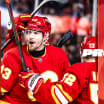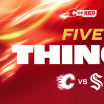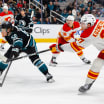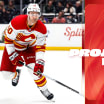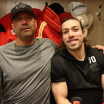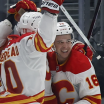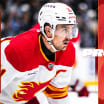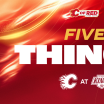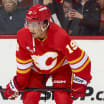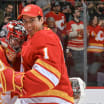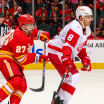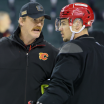Don Maloney is not desert bound anymore.
In fact, he won't see his home in Arizona for quite some time.
And he doesn't mind.
Maloney, the newest pro scout of the Flames, took the time off on a lengthy scouting trip to chat with CalgaryFlames.com for a Q&A session that wandered from his hockey heroes growing up, to his greatest hockey achievements, to if and when he'd like to jump back into the general managerial ranks.
Don Maloney - Q&A
CalgaryFlames.com goes one-on-one with Don Maloney
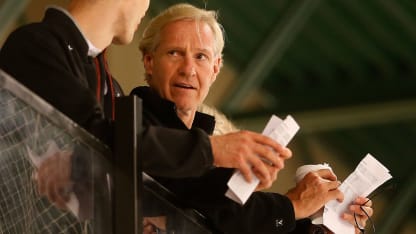
© Christian Petersen/Getty Images
By
Aaron Vickers
NHL.com International Editorial Manager
CALGARYFLAMES.COM: When did you first fall in love with the game?
MALONEY: I'm really dating myself. You have to go back many, many years. Really for anyone who's 50 and older … back in the 60s, there really wasn't any other sports where I grew up. I grew up in Lindsay, Ontario and you either played hockey or figure skated or you didn't do anything else. There wasn't any football, basketball or baseball. That's what we did. I had two older brothers. My dad played growing up. My earliest memories … that's what we did. We did it on the pond. We did it in the street. We did it in the basement. We did it in the classroom when the teacher wasn't looking, on the floor with rulers. It's been a lifelong passion of mine. I, quite frankly, don't know anything else. It's been great to me. I have no complaints.
CALGARYFLAMES.COM:Who was your favourite player growing up?
MALONEY: I was a huge Maple Leafs fan. Probably 95 percent of southern Ontario was Leafs fans at that time. Dave Keon was my favourite player growing up, forever. My mom, my dad, my brothers … we were all huge Leafs supporters. My dad's family…they're farmer up in Stratford and Mitchell … they all still live-and-die Leafs hockey. When I turned 13, I started to work at Bobby Orr-Mike Walton Sports Camp in Orillia, and when Bobby Orr was there I became quite a Bobby Orr fan. Deep down, the Leafs were my team and they probably still have a place in my heart somewhere deep, deep, deep down there.
CALGARYFLAMES.COM:Spanning all teams from all generations, who is in your all-time lineup?
MALONEY: Oh boy. I think you have to start with Wayne … The Great One. I've been fortunate. I met Wayne Gretzky when I was 19, he was 16, at a hockey school at St. Andrews, New Brunswick. We played each other a little bit in junior. We crossed paths a little bit in an all-star game, and a little bit with the Rangers in New York when he was playing and I was assistant manager. Obviously when I went to Phoenix he was the managing partner and oversaw the hockey side and hired me as a manager. Not that it means anything, but to me there's nobody better and nobody close.
Mario Lemieux would have to be my second choice.
I'm probably more in a current 34-year era as opposed to going back to Dave Keon and Tim Horton and Jean Beliveau and the Gordie Howe era. That's a little bit before my time. There's just so many different options for No. 3. The game to me has changed so much and back in the 70s and early 80s, the offensive explosive eras with the numbers being so gaudy and you get to today's game and you see what a Crosby does. The top players today you admire what they do.
Maybe a Keon, just for my 7-year-old sake. He's my guy. I'm sticking with him.
On the blueline, Bobby Orr … I don't think anybody came close to him for me. The guy that I thought was just a phenomenal player was Nik Lidstrom. He did it all for so long. He could still be playing. He was so good and so efficient in his game. Those two would be at the top of my list.
Goalie? Who would I want?
I was always a huge Martin Brodeur fan. That's really current. Because I was with the Rangers and they kept beating us all the time. Good or bad, you could play him 82 games. Win, lose or draw. There's some argument … you get a guy like Hasek who was so dominant for four or five years. There's nothing close when you look at his numbers. Then you get into the Drydens and Johnny Bower and Terry Sawchuk.
Maybe Marty Brodeur. I would take him every day of the week.
CALGARYFLAMES.COM:When did you realize hockey could be a career for you?
MALONEY: I guess the best way I could describe it … my brother Dave was two years older. He was one of those kids that was always better than his age group. In Peewee he was playing in Bantam. In Bantam he was already playing Junior B. He was always the captain and best player on anything he did. I was never a star player or a top player on any of the teams I played on. Probably around 16, 17 … he got drafted and got a contract and got to the pros. That's when the light went off for me. If he can do it maybe I can do it. It was different then. It was never really something you hoped for. It was more of a dream. I never thought it was hockey or bust. You were always thinking of what else you were going to do with your life when hockey played stopped. But around 16 or 17 when I saw my brother Dave turn pro and start to play pro hockey … that's when I thought maybe I have a chance to play pro hockey. It wasn't any deeper than that.
It was just sort of fortuitous that as my career ended I was in the right place at the right time. I was with the Islanders and Bill Torrey was looking for some help and I happened to be there. He helped show me the business. That's how I started to get into the business-side of the game.
I've enjoyed it. There's obviously a few dark moments. For the most part I've been very, very fortunate to have a career in hockey and be able to stay in hockey.
CALGARYFLAMES.COM: Biggest adjustment from going from player to a manager?
MALONEY: I was always a worker. We grew up on a farm when I was young. We had to do chores before school and after school. My dad worked construction. I think part of the motivation to be a hockey player was working construction with my dad. We built bridges until hockey started. That was real work. That was hard labour. That was the driving force. I had to find something else. It was too hard.
I think the hours and the time commitment … you can't cheat the system is the way I put it. You can't go in at 9:00. You don't have a players' schedule. You can't show up at 9:00 or 9:30 and be done by 1:30 or 2:00. When you start working in the game, your day starts early and it ends when the last game ends … whatever time that ends. It's seven days a week.
When you get into the management side, I always felt coaches had a hard job, but at least they have summers to recharge the batteries. To me on the manager's side, I found that there's really so little time off regardless of the time of year. There's always something. You're going, planning or dealing with something.
The amount of commitment it takes to have success and the work you put in, and it's not just going to watch hockey games … it's video, reports, talking to people and relationship and scouts and owners and agents, you name it … there's a lot of things involved to have success.
CALGARYFLAMES:COM:Biggest accomplishment in hockey, ,as a player, manager or otherwise?
MALONEY:I've had moments.
I'm proud of the work we did as a group, and I include Brad Treliving in that, in Arizona when we went through such difficult ownership times. To be able to survive it and even strive forward and put on a good product … those three or four years there … there were some dark years trying to keep your head above water. I'm proud of the work the organization did. I really do think if it wasn't for that work that team wouldn't be there anymore. They'd be somewhere else.
As a player we went to the Finals in 1979. Those are career highlights. I was fortunate to be with Team Canada for a couple years in 2003 and 2004. We've won gold medals. To me it's all about winning and when you have success.
I'm proudest of the group effort it took to keep Arizona afloat until they had some sort of ownership stability. There's a few seasons there that were good. Unfortunately there were some that weren't so good. That's why I'm heading into rinks to scout instead of doing something else.
CALGARYFLAMES.COM:How has the routine changed from being a GM to scout?
MALONEY: As a manager you have so much responsibility in so many areas to take care of your team. It's a 24/7, 365 … every waking moment you have you're dialed into your team. This to me is a step back. It's taking a deep breath. It's reconnecting with the game and the people in the game. I was talking to Kenny Holland in New Jersey, and he's telling me about his team and some of their things. He's in New Jersey watching Anaheim and New Jersey, but his mind -- and I'm the same way -- half on that game and half on everything else going on. Now I can go to games and watch the game and really focus on players. That's where I really think I can help the Flames and Brad. I have a fresh viewpoint now. Instead of going in there with my mind somewhere else and thinking about so many different things, I can really dial in and watch players and where the game is trending and how we can make the Flames a little bit better.
CALGARYFLAMES.COM: Still, do you miss being a GM?
MALONEY: The first step is really to live again. The last three or four months prior to the season starting it takes over your life and everything about your life. I bought a place in Arizona a year ago September. When I got told to leave the desert and never return, I was able to unpack some boxes and put some pictures up … things you just don't get to. Really, I felt it was the time to decompress and reconnect with people. It's been terrific. It's been refreshing for me. I'm not sitting here having to manage again. I don't feel that way at all. My goal going forward is to work with good people to win a championship … whether that's as a manager down the road or a scout or driving the bus or somewhere in between. I don't know. I don't know. The future will tell. I enjoy what I'm doing.
I'm in the middle of a 13-game trip here. But I like to work and I like the game. I almost feel like … vacation's not the right word, but its not so bad. You get on a plane. Get off a plane. Watch a game. File a report. Talk to people. And you do it all over the next day. It's not overly challenging, but the trick is to find some players that can make us better. That's the job. That's what I intend to do.

